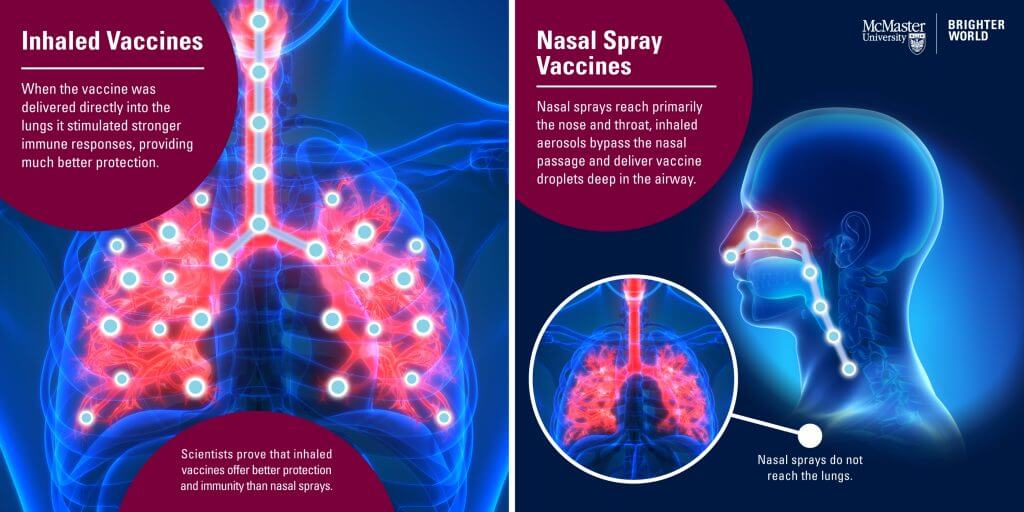HAMILTON, Ontario — Using an inhaler may provide an even better option than nasal sprays as scientists look to make more efficient vaccines during the coronavirus pandemic. That’s the conclusion by a team at McMaster University, who found that inhaled aerosol vaccines actually do a better job of delivering medication deep into the airway.
Researchers say that nasal sprays generally reach tissue in the nose and throat. However, inhaled aerosols completely bypass the nasal passage, moving vaccine droplets from the mouth straight to the lungs. In turn, this triggers a greater immune response.
Study authors used a tuberculosis vaccine to compare these two delivery methods, measuring how well they distribute medication among lab animals. The team found that when vaccine droplets go directly to the lungs, it stimulates a much stronger immune response and better protection against TB.
“Infections in the upper respiratory tract tend to be non-severe. In the context of infections caused by viruses like influenza or SARS-CoV-2, it tends to be when the virus gets deep into the lung that it makes you really sick,” explains study co-author Matthew Miller, the Canada Research Chair in Viral Pandemics at McMaster, in a university release.
“The immune response you generate when you deliver the vaccine deep into the lung is much stronger than when you only deposit that material in the nose and throat because of the anatomy and nature of the tissue and the immune cells that are available to respond are very different,” Miller says.
“This study for the first time provides strong preclinical evidence to support the development of inhaled aerosol delivery over nasal spray for human vaccination against respiratory infections including TB, COVID-19 and influenza,” adds study co-investigator Zhou Xing, a professor at the McMaster Immunology Research Centre and Department of Medicine.

Creating a new vaccine delivery system for COVID
With COVID-19 responsible for more than six million deaths worldwide, researchers say there’s an urgent need to create vaccines that deliver medication straight to the mucous lining of the respiratory tract. Previous studies have noted that the current COVID vaccine injections don’t do this.
To this point, scientists have focused on creating nasal sprays which could replace these shots. Now, the McMaster team says a nasal spray doesn’t go far enough.
A Phase 1 clinical trial is currently underway which is evaluating how well inhaled aerosol vaccines work on adults who already received two or three COVID mRNA vaccine doses. The team also notes that nasal vaccines for the flu have proven very effective in children but are much less effective in adults.
Researchers add that an inhaled vaccine, which targets the lungs and upper airways, can provide maximum protection with a much smaller dose than patients currently need with a shot in the arm.
The findings are published in the journal Frontiers in Immunology.

